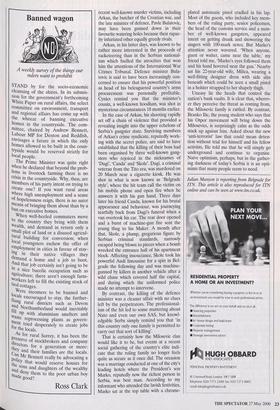Banned wagon
A weekly survey of the things our rulers want to prohibit STAND by for the socio-economic cleansing of the shires. In its submis- sion for the government's forthcoming White Paper on rural affairs, the select Committee on environment, transport and regional affairs has come up with the wheeze of banning executive homes in the countryside. The com- mittee, chaired by Andrew Bennett, Labour MP for Denton and Reddish, envisages a future in which the only homes allowed to be built in the coun- tryside would be reserved strictly for local people. The Prime Minister was quite right when he declared that beyond the prob- lems in livestock farming there is no crisis in the countryside. Why, then, are Members of his party intent on trying to create one? If you want rural areas where high unemployment and a sense of hopelessness reign, there is no surer means of bringing them about than by a ban on executive homes. When well-heeled commuters move to the country they bring with them wealth, and demand in return only a small plot of land or a disused agricul- tural building for conversion; when local youngsters eschew the offer of employment in cities in favour of stay- Mg in their native villages they demand a home and a job to boot. And that job certainly isn't going to be in a nice bucolic occupation such as agriculture; there aren't enough farm- Workers left to fill the existing stock of tied cottages. Were incomers to be banned and locals encouraged to stay, the further- flung rural districts such as Devon and Northumberland would inevitably fill UP with aluminium smelters and waste reprocessing plants as govern- ment tried desperately to create jobs for the locals. As for rural Surrey, it has been the preserve of stockbrokers and company directors for a generation or more: Cey and their families are the locals. Mr Bennett really be advocating a Policy that would reserve houses for he sons and daughters of the wealthy made deny them to the poor urban boy ade good?
Ross Clark


































































 Previous page
Previous page